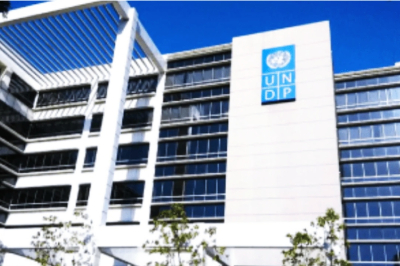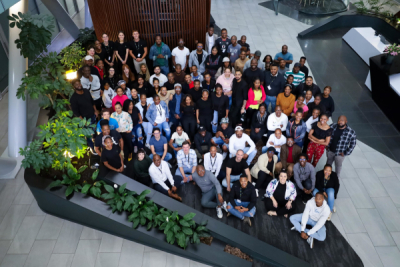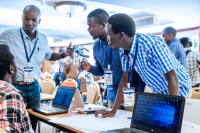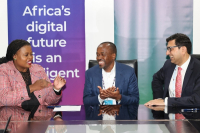Limited financial resources usually prevent some amputees from buying prostheses, therefore restricting their independence. In response to this issue, Nada Ghammem provides a solution by offering affordable, personalized bionic prostheses. Her innovative approach has earned her recognition and awards.
Nada Ghammem (photo) is a Tunisian entrepreneur and the founder/CEO of Bionic Soul, a startup that develops and manufactures advanced, personalized leg prostheses for amputees. She studied mechanical engineering at the Higher Institute of Technology Studies in Sousse from 2018 to 2021. She got the idea that would later lead to Bionic Soul (in 2022) during that period.
Through her company, she strives to offer a more cost-effective alternative to traditional prostheses without compromising product quality. Using advanced technologies, Bionic Soul designs its prostheses according to the measurements of each patient, who also benefits from personalized follow-up. Working in partnership with hospitals and customers to offer its services to as many patients as possible, the company also raises awareness of the importance of making bionic prostheses accessible to amputees.
Bionic Soul has developed two distinct types of prostheses. The first, ErgoLeg, is a mechanical prosthesis designed to provide fundamental mobility, equipped with a joint and a walking damper. This enables users to regain independence and resume their daily activities. Successful testing of this prosthesis version was concluded in October 2023.
The second option, BioniLeg, stands out as an intelligent bionic prosthesis incorporating sensors and an artificial intelligence algorithm. This advanced design offers users an almost natural, adaptive walking experience. Additionally, the company has created a dedicated app that allows users to customize their prosthesis settings, monitor their physical activity, receive personalized advice, and access valuable resources for both rehabilitation and maintenance of their prosthetic devices.
With Bionic Soul, Nada Ghammem won the international women's prize at the 13th edition of the international stage of Orange’s POESAM, which was concluded in October 2023. She received €20,000 in funding.
Currently, Nada Ghammem is a student at Enova ROBOTICS, a company specializing in the design and manufacture of robots through combined expertise in software, hardware, and perception. She began her professional career in 2018 as a student intern at the Centre Technique des Industries Mécaniques et Électriques (CETIME) in Tunisia. She also completed an internship in 2019 at Precimold Plastic Industries Sdn Bhd, a plastics company located in Malaysia.
Melchior Koba
The wave of digital transformation is sweeping across Africa, and Benin stands out as a commendable example. The country has initiated the digitization of a pivotal sector within its economy.
On Tuesday, November 14, Benin’s National Land Transport Agency (ANaTT) officially launched the Electronic Road Freight Management System (SYGFR). Financed to the tune of 290 million CFA Franc (around $479,480) by the Belgian Development Agency (Enabel), the platform provides sectoral stakeholders with an interface for real-time monitoring of road transport activities, freight transport especially.
Once completed, SYGFR will include three modules: freight supply management, statistics and dashboard management, and transport supply management. For the time being, authorities have launched the transport supply management module, which will among other things, facilitate the construction and maintenance of a database of professional drivers, the issuing of transport authorizations and transport cards, and registration of other freight players such as customs brokers and freight lessors.
In addition to facilitating the issuance of transport authorization and cards, the transport supply management module is expected to ease the issuance of consignment notes for freights from the Autonomous Port of Cotonou and other cargo hubs across the country.
"Effective organization is a prerequisite for the development of any sector. This [platform] is a stride forward and we need to embrace a collaborative thinking approach to meet ongoing challenges,” said Jacques Ayadji, who was representing Jose Didier Tonato, the Minister for the Living Environment and Transport in Charge of Sustainable Development.
Under President Patrice Talon, Benin has initiated the digitization of its services to become a tech hub in the West African region. The COVID-19 pandemic accelerated the process, and since then, more than a thousand services have been digitized. According to the United Nations e-government development index for 2022, Benin ranks 149th out of 193 countries, with a score of 0.4264, a leap of 8 places from 2020.
Adoni Conrad Quenum
In an era where digital technology is rapidly gaining global traction, the Chadian government is intensifying its endeavors to catch up in the sector. Numerous initiatives are in progress, and results are already perceptible.
Chad and Morocco will extend their bilateral cooperation in the field of information and communication technologies (ICT). To this end, a technical assistance memorandum of understanding has been signed between Chad's ICT development agency ADETIC, and Morocco’s telecom regulator ANRT.
The collaboration includes training for ADETIC engineers and exchanges of experience between the two agencies. The aim is to help Chad adapt and implement the Moroccan ICT model in favor of digital acceleration in the country, with a view to a prosperous digital economy.
The collaboration between the two regulatory agencies overseeing the telecommunications sector is a crucial component of the Chadian government's strategy to bridge the gap in the digital domain. This partnership materialized following a three-day mission by the ADETIC delegation to Morocco, during which they visited the host country’s digital development agency ADD and the ARNT.
"Most of the discussions focused on the Moroccan model for the digital transformation of public administration, the legal and regulatory framework, the management of ICT technical infrastructures, as well as domain name management and the provision of universal services," ADETIC wrote on Facebook.
This new partnership allows ADETIC to leverage the extensive expertise of ARNT, which boasts 25 years of experience in telecommunications sector regulation, approval of telecommunications equipment, administration of ".ma" domain names, and the management of electronic certification, among other areas.
Samira Njoya
Technology advances offer unlimited job creation and development potential. To capitalize on those opportunities, fast-track technology adoption, and address the growing demand for skilled professionals in the evolving tech landscape on the continent, African countries are teaming up with international institutions.
The United Nations Development Programme (UNDP) and the Federal Government of Nigeria will collaborate to provide a significant boost to the country's tech sector. The Minister of Communications, Innovation and Digital Economy, Bosun Tijani announced the partnership on Tuesday, November 14 in a tweet.,
The partnership aims to offer 3,000 internship slots for participants in the Federal Government's tech initiative, 3MTT, which is designed to enhance skills and opportunities in the technology sector.
The 3,000 internship opportunities provided by the UNDP will catalyze individuals looking to gain hands-on experience in the dynamic field of technology. It not only offers a unique chance for personal and professional growth but also aligns with the broader goal of fostering a robust and competitive tech ecosystem in Nigeria.
The collaborative effort underscores the two parties’ commitment to bridge the gap between theoretical knowledge and practical application. By providing real-world exposure to aspiring tech professionals, this initiative is poised to make a tangible impact on the nation's tech landscape.
In a joint statement, representatives from both the UNDP and the Nigerian government expressed their enthusiasm for the partnership and its potential to drive positive change in the tech sector.
Hikmatu Bilali
South African proptech startup Neighbourgood announced, last week, the acquisition of Local Knowledge, another South African startup operating in the travel technology industry. The deal is worth $1.5 million.
South African insurtech Pineapple announced on Thursday, November 16, via its social networks, the successful completion of a 400 million rand (approx. $21.9 million) Series B funding round. "This funding round stands as a testament to our tech and AI-powered operating model, enabling our mission to offer affordable and comprehensive insurance to all South Africans," said Pineapple co-founder Marnus van Heerden.
mHub, a key player in Malawi's technology ecosystem, promotes innovation and entrepreneurship. It has already created a thousand jobs and trained tens of thousands of young people.
mHub is Malawi's first technology and innovation hub, located in Lilongwe, with workspaces in Blantyre (Malawi) and Lusaka (Zambia). Founded in 2014, the hub's mission is to promote technology, entrepreneurship, and innovation in Malawi. It offers tailored technology solutions, entrepreneurship support, and digital skills training for Malawian youth and businesses.
The center was initiated by Rachel Sibande, a Malawian computer scientist and social entrepreneur. A fervent advocate of technology in Africa, she was featured on the Forbes list of Africa's 30 most promising young entrepreneurs in 2016.
mHub offers creators tailored entrepreneurial support, software development services, co-creation opportunities, digital skills, and on-demand startup assistance. It also hosts programs and activities to strengthen Malawi's entrepreneurial and innovative ecosystem. One such program is Digital Malawi, a project that has benefited over 500 young people, some of whom have received funding of around $2,500 as seed capital for their businesses.
The Modern Cooking for Healthy Forest Accelerator (MCHF), a project aimed at improving forest management and mitigating land-based emissions, is another of the center's initiatives. It has trained 94 entrepreneurs and linked 20 participants with beneficiaries, thereby contributing to sustainable forest management.
In partnership with Care Malawi, mHub has also set up a project called Ntchito Mbambande. This focuses on improving employability and self-employment opportunities for young people. It is mainly funded by the European Union (EU) and operates in five development districts: Blantyre, Machinga, Salima, Dedza, and Mzimba.
Since its inception, mHub Malawi has facilitated over $1 million in funding for emerging entrepreneurs, created over 1,000 jobs, and trained over 42,000 young people in business and technology. In 2018, mHub won the Most Innovative Organization award at the Cloud Awards and the IOT Awards.
Melchior Koba
In recent years, the African continent has witnessed a proliferation of startups. However, in numerous countries, authorities have not sufficiently supported their growth. Recognizing this gap, Kampala has decided to address the issue.
Uganda is planning to introduce a national policy for startups. The project, led by the Private Sector Foundation Uganda (PSFU), is supported by the Mastercard Foundation and coordinated by the Ugandan Ministry of Commerce, Industry, and Cooperatives. The aim of the policy is to govern interactions between the government, incubators, startups, and investors, with a view to promoting a culture of innovation and entrepreneurship in the country.
"Several multinationals come here and get several business facilitation privileges yet not so much is done for local start-ups. We believe that with this policy, Ugandan start-ups will have a chance to compete favorably on the market as it will not only establish what they need but also how to get support," said Keneth Twesigye, lead policy at Startup Uganda.
Uganda is actively enhancing its technological ecosystem. To qualify as a startup in the country, specific conditions must be fulfilled. These include maintaining a temporary management structure, allocating a portion of the budget to research and development, having majority ownership by Ugandans, and being locally incorporated in Uganda.
Let’s note that in Africa, the technology ecosystem is booming. African startups attract investors from all over the world, but for a variety of reasons, the largest share of funds is invested in Nigeria, South Africa, and Kenya. In the "Venture Capital Activity in Africa Q3 2023" report published by the African Private Equity and Venture Capital Association (AVCA), over $2.95 billion was invested in African startups in the first nine months of 2023.
Adoni Conrad Quenum
The South African government is stepping up initiatives to accelerate the adoption of broadband Internet as part of its digital transformation ambitions. It is supported in its efforts by a number of key international partners.
The International Finance Corporation (IFC) and South African investment bank Rand Merchant Bank (RMB) recently committed to investing a total of $49.2 million in the Eastern Cape fibre project piloted by Liquid Intelligent Technologies. Each of the two parties will invest 450 million rand ($24.6 million).
"Not only will this investment from RMB and IFC help fund the expansion of our fibre backbone network in the Eastern Cape, but it will also help us upskill more South Africans and create employment. We believe this collaboration sets a new benchmark for the financing and development of digital infrastructure in South Africa," said Hardy Pemhiwa (photo, center), Group Chief Executive Officer of Liquid Intelligent Technologies.
The funding granted to Liquid Intelligent is part of the three companies' collective commitment to advancing broadband connectivity in South Africa in general, and particularly in Eastern Cape, one of the country's least connected regions.
According to statistics quoted by Liquid, only 65% of households in the Eastern Cape have access to the Internet. What's more, only 5% of the province's households have Internet access from home, which is twice as low as the South African average, where 10% of the total population has Internet access from home.
Ultimately, the project will reduce the digital divide in the Eastern Cape and extend Internet access to underserved areas. The aim is to support the South African government's National Development Plan to achieve 100% broadband coverage in the country by 2030.
Samira Njoya
Determined to provide Africans with a social networking platform designed just for them, three young Africans have embarked on the adventure of digital entrepreneurship. Their solution is named Umojja, which means "unity" in Kiswahili, a Bantu language spoken in many parts of the continent.
Umojja is a social networking platform developed by a Congolese startup. It enables users to access a variety of creative content, news, and personal moments shared by other platform users. The startup, based in the city of Goma and founded by Congolese Charles Muleka Kitwa Djo Kyadi and Nigerian Temilade Oduwalo, launched its solution in 2023.
"Leveraging the lessons learned from the ravages of war, Umojja aims to provide a secure platform for young people to exchange information. Our focus is on fostering not only the development of our own country but also contributing positively to others, given that our nation is already a member of various organizations. By connecting through Umojja, we strive to extend these benefits beyond our borders, facilitating mutual growth and collaboration," said Charles Muleka Kitwa.
Currently, the solution features only an Android application. Users, whether on the web platform or the mobile app, can register by inputting various personal details, including their name, email address, telephone number, gender, and country of origin. Upon successful registration, users gain access to the platform, enabling them to follow content creators, news media accounts, and other users.
Umojja offers users a range of features, including the ability to broadcast live videos, make video calls, place ads, create a company page, conduct polls, share videos, and send text messages. The platform actively combats the dissemination of fake news. It adopts a unique approach by compensating content creators based on the viewership of their videos. Since the launch of its mobile app in July 2013, it has been downloaded over a hundred times, according to Play Store data.
Adoni Conrad Quenum
More...
Christine Namara is one of Africa's leading investors and mentors most committed to the development of the technology ecosystem. Her appointment to Flat6Labs is proof of her expertise and commitment.
Christine Namara (photo) is a Kenyan businesswoman, investor and mentor. On Wednesday, November 15, 2023, she joined leading MENA seed-stage venture capital firm Flat6Labs as a partner in its Africa Seed Fund (ASF).
"With innovation as our compass and collaboration as our engine, I am honored to join Flat6Labs, a pioneering force in shaping Africa’s entrepreneurial landscape. Together, we will embark on a transformative journey, unlocking the vast potential of startups across the continent. In this interconnected world, every idea has the power to change lives. I am excited to champion these innovations, catalyzing progress and leaving a lasting impact on communities in Africa and beyond," Ms. Namara said, according to a release published by Flat6Labs.
The Africa Seed Fund she is joining was recently set up by Flat6Labs to extend its reach in Africa. The $95 million investment vehicle targets North, West, and East African regions, to invest in over 160 seed-stage startups in the region's tech ecosystem.
With her wealth of venture capital and private equity experience, the new partner will be a key asset in achieving the fund’s objectives. Indeed, in 2012, she graduated from Uganda Christian University with a Bachelor's degree in Economics and Management, specializing in Law and Business Policy. She then kickstarted her professional career as an executive administrator trainee at the Institute of Customer Service Kenya the same year. In 2013, she worked as an intern at CS Consulting Ltd. as well as a member of the customer service and marketing team at Thornsoft International.
Later, in 2021, Christine Namara joined The Baobab Network, a Nairobi-based accelerator that invests in early-stage technology companies across Africa, as a senior venture capital partner. The following year, she was appointed Head of Enterprise at the same accelerator, a position she held until October 2023.
Melchior Koba
O'Botama catalyzes innovation and is a driving force for entrepreneurial change in Africa. It provides support, training, and assistance to young entrepreneurs in securing financing for their businesses.
The O'Botama Collaborative Innovation Workshop (AIC) is a business incubator based in Cameroon. Since 2018, it has been supporting local Cameroonian entrepreneurs and those from the diaspora in the development of their businesses. It was created by the collective O.S.E.R. L'Afrique (a non-profit association established by the diaspora) and is headed by Benjamin Ngongang, an experienced professional in the financial and investment sector.
AIC is dedicated to catalyzing talent and strengthening the entrepreneurial spirit among young Africans, guiding them in creating innovative solutions for their region. To fulfill this mission, AIC provides comprehensive support to project leaders from conceptualization to value proposition assisting in the implementation of their innovation or activity, aiding in the search for financing, and facilitating connections with suitable partners.
It features a coworking space that regularly welcomes professionals and an online platform for events, training, and diverse services, it offers an incubation program specifically designed to support and accelerate innovative projects with a social impact. Program members receive tailored training sessions to address their unique needs, coupled with expert guidance to ensure the successful development of their businesses.
The incubator also has a center of expertise where a team of experts offers technical assistance, consultation, and training in the fields of law, taxation, labor and social security, project management, accounting, and finance. It also offers training in business management, digital marketing, accounting management, and personal development.
Since its creation, O'Botama has supported over 40 companies and project leaders in Cameroon and welcomed over 1,000 participants to its activities. It regularly hosts 111 coworkers in its shared workspace. A member of the AfriLabs network, the incubator is supported by Afric'Innov, Genius Center, Kmer Tech, Fiatope, and Objis, among others.
Accra will host the first edition of the Global Conference on Cyber Capacity Building (GC3B) from November 29 to 30.
The GC3B, organized under the theme "Cyber Resilience for Development", aims to build a bridge between politicians and cybersecurity industry leaders. The aim is to contribute to the advancement of cyber capacity building on a global scale. Over 800 cybersecurity experts are expected at the conference.
While presenting promising prospects and undeniable opportunities, technological advances can pose challenges in combating crimes, especially in Africa. This compels defense and security forces to improve their capabilities, notably those related to cybersecurity.
Last Monday (November 13), the Chinese Embassy handed a digital forensics laboratory to the Seychelles police’s cybercrime division. According to the Seychelles News Agency, the laboratory was handed out by Mu Jianfeng (photo, left), Chargé d'Affaires of the Chinese Embassy in Seychelles.
The laboratory is funded, to the tune of one million Yuan ($137,000), by the Chinese government. "The laboratory will be fully operational in the next few days, and its main functions include secure data extraction, storage media backup, rapid data acquisition, data analysis and authentication, and data recovery. It will be an effective tool for the Seychelles police and relevant authorities in digital data investigation and evidence collection," said Mr. Jianfeng.
The new laboratory comes at a time when the Seychelles government is stepping up measures in response to a growing rise in cybercrime in the country. In November 2021, a new law on cybercrime and other related offenses came into force in the country after being approved by the National Assembly.
In January 2023, discussions were also held between the Seychelles police force and an Interpol delegation to set up a unit to combat cybercrime.
Through this acquisition of technical equipment and the training of human resources to combat cybercrime, Seychelles will be able to secure its information systems, which are an indispensable component of digital transformation.
Samira Njoya















